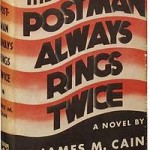 The Postman Always Rings Twice/1946/MGM/113 min.
The Postman Always Rings Twice/1946/MGM/113 min.
In the opening of “The Postman Always Rings Twice,” a sign reading “MAN WANTED” flashes at us twice. This man, John Garfield as it happens, is really wanted. But you wouldn’t know it from Lana Turner’s imperious entrance.
She drops a tube of lipstick, then deigns to let him pick it up and return it to her. He decides to let her get it herself. She’s unruffled and he’s hooked. In a way, these first few minutes of the film foreshadow the sexual power play between Garfield’s Frank and Turner’s Cora.
The godless-like Cora, with her platinum hair, pouty lips and gorgeous curves, is arguably Turner’s most memorable role. One of film noir’s most famous femmes fatales, she is by turns a come-hither, passionate seductress and an icy blonde who likes to be the boss. Notice how often she wears white, sometimes from head to toe.
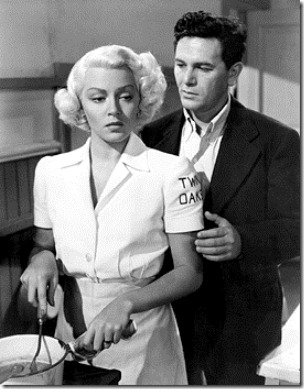
Lana Turner as Cora and John Garfield as Frank cook up trouble in the restaurant Cora runs with her husband.
Garfield as Frank gives her a run for her money, both in looks and attitude. Ephraim Katz writes of Garfield (born Julius Garfinkle, the son of a poor immigrant Jewish tailor): “[His] screen character was … not much at variance with his own personality – that of a cynical, defiant young man from the other side of the tracks, a resilient rebel with a chip on his shoulder who desperately tries to charm and muscle his way onward and upward.
“Despite the mediocrity of many of his films, Garfield’s boyish virility and his ability to project a soulful interior underneath a pugnacious façade made him an attractive star to many filmgoers. When given a proper vehicle, he proved himself a sensitive and solid interpreter.” (Garfield was later blacklisted for refusing to name friends as Communists in response to a House Un-American Activities Committee investigation.)
“Postman” more than qualifies as a proper vehicle. Frank, a hitchhiker at loose ends, stops at a roadside restaurant on the outskirts of LA and sees the MAN WANTED sign, posted by the owner, Cora’s chubby, cheerful, and much older, husband Nick (Cecil Kellaway). Nick persuades Frank to stay and work; not a bad deal considering that he also gets room and board.
Before long, Nick and Cora become lovers and decide to do away with Nick so that they can start their new life together with a fat pile of cash. From there, things get darker and more diabolical. They botch their first attempt (death by electrocution) and their second try (they fake a car crash) results in charges being brought against them, which may or may not stick.
“Postman,” based on the James M. Cain novel and directed by Tay Garnett, is about as jet-black and unrelentingly bleak as they come. Harry Ruskin and Niven Busch wrote the script. There is no comic relief or guy-buddy subplot of the kind that you get in Billy Wilder’s “Double Indemnity,” also based on a Cain novel and written by Wilder and Raymond Chandler.
Also, the character of Nick gets a fair amount of screen time and, far from being a dire wretch of a husband (like the husband in “Double Indemnity,” played by Tom Powers), he’s affable and kind. He knows she doesn’t love him and even seems inclined to turn a blind eye if Cora and Frank want a romp in the hay. The dour vision of their betrayal, ill-fated reconciliation and their dogged determination to kill him feels far more uncomfortable – queasy even.
Because Garnett isn’t as visually stylish as many of the noir directors, “Postman” is a more blunt rendering than other essential noirs. But it’s also possible that Garnett, who was also a writer, was more interested in exploring the nuances of Cain’s book. Garnett and Cain grapple with the deepest issues of noir – for example, upending the myth that America is a classless society.
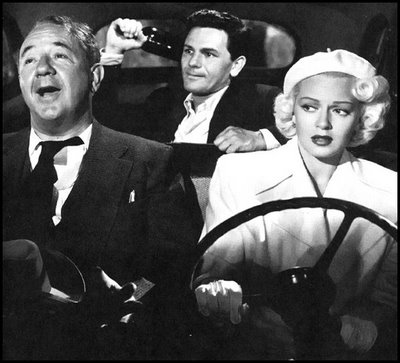
Cecil Kellaway (left) plays Nick, Cora’s husband, who is not bad as portly older husbands go. This lends his murder much gravity.
Only slightly less chilling than the violence perpetrated by the waitress and the manual worker, Garnett suggests, is the cavalier, snarky attitude of these two bourgeois buddies on the “right” side of the law (Leon Ames as district attorney Kyle Sackett and Hume Cronyn as defense lawyer Arthur Keats).
The case is nothing more than a game to them and they place a $100 bet on who will win. They’re not above using questionable methods to yield their desired results. Yet, they are considered upstanding members of society, whereas Cora and Frank are common criminals who must be punished.
Another point in Garnett’s favor: He gets excellent work from the leads and supporting players (also look out for noirista Audrey Totter). Cora and Frank are complicated parts that require range, depth and the ability to project irony.
Their love may be twisted, it’s true, but it goes through many incarnations and we sense that they are drawn to each other from mutual desperation and shared disappointment. As Frank tells her: “We’re chained to each other, Cora.”
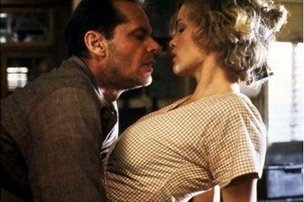
Jack Nicholson and Jessica Lange made a steamier version of the story in 1981, directed by Bob Rafelson.
To be sure, there’s no shortage of gloom. But, with leads as gorgeous and sexy as Garfield and Turner, every minute makes compelling viewing.
When Bob Rafelson remade the movie in 1981 with Jessica Lange and Jack Nicholson, replete with raunchy sex scenes, Frank and Cora sizzled once more.
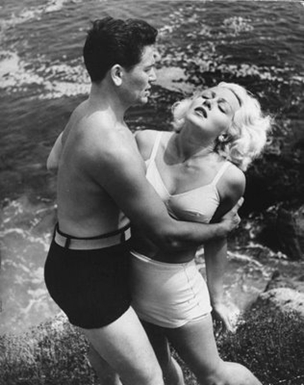











From FNB readers